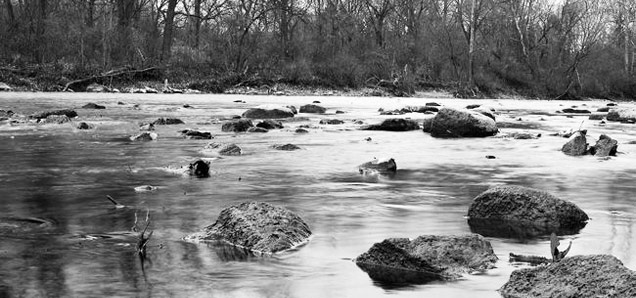Thames River water quality slowly improving
 CREDIT: LFPRESS.COM
CREDIT: LFPRESS.COMThe Thames River at Gibbons Park in London in early November.
Every five years, the Upper Thames River Conservation Authority releases 28 report cards on local watersheds within the upper Thames River.
The quality of the 28 Thames River watersheds was graded between Cs and Ds. The grades are a little below the par, but the UTRCA is not concerned; according to the report, "the UTRCA watershed target is a B grade. Water quality has improved in 12 watersheds since 2007, and has remained steady in 16 watersheds. No watersheds have declined in the past five years."
London has 11 watersheds in the municipality, and none received a mark over 'C.' On the positive side, none posted a failing mark. Mostly Ds were given out on the surface water quality. Another positive fact is that all the London watersheds showed either 'Improved' or 'Steady' status along with their mark. There are only three statuses to be given out, with the third one being 'Declined.'
Robert Huber, president of the Thames River Anglers, a non-profit organization to preserve and protect the Thames River, said the River was 120mm below the average. It rose to 60mm below average after the heavy precipitation from Hurricane Sandy, which was a good thing, health-wise, for the Thames River. "When there is not a lot of rain, silt builds up at the bottom of the river, then when you get that heavy rainfall, like the one that Hurricane Sandy brought London, it flushes out the river." Huber added that if we didn't get that heavy rainfall, the low water levels would have been more noticeable and that would also affect the quality of the water.
The UTRCA's website (thamesriver.on.ca) shows three levels of low water status. Since May the river has been at a level two and only the provincial government can bump the level up to three. Steve Sauder, marketing specialist with the UTRCA, said the rain we saw in October really helped out the river. "We've seen improvements this fall; whether or not that's enough has yet to be determined. It really depends on the kind of winter we get." Sauder added that as of right now, we are seeing more normal flows in the river, but there is still a groundwater recharge that needs to happen. "We had started to deplete our groundwater supply; it goes down when the river sees low water conditions for as long as we did."
Both Sauder and Huber were very optimistic about the future of the Thames River, and both said that the upcoming winter months are very important; they would not like to see a year like London saw last year: a warmer than usual winter with little precipitation, a dry spring, and then a hot and dry summer.













